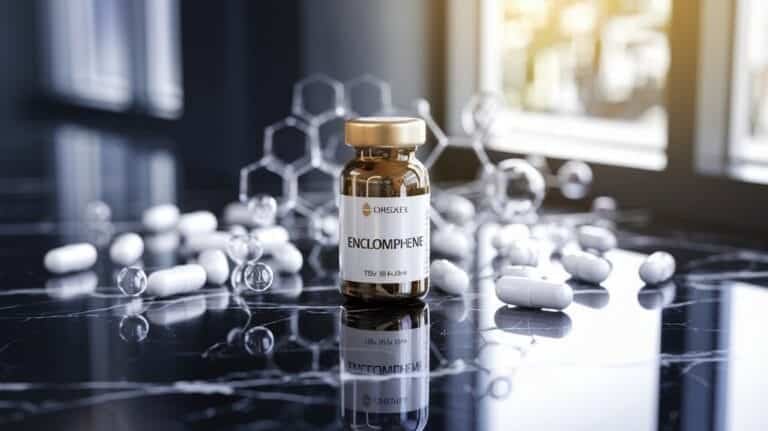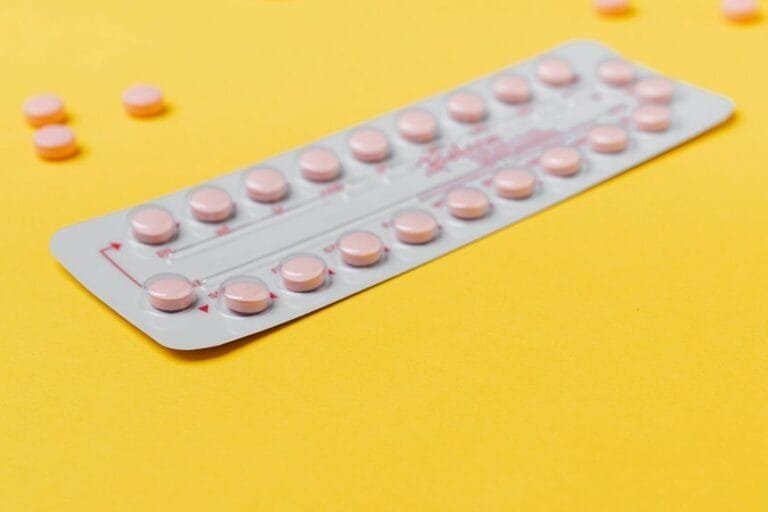Enclomiphene isn't testosterone itself; it's a selective estrogen receptor modulator that stimulates your body to produce more testosterone naturally. It works by blocking estrogen in the hypothalamus, increasing gonadotropin-releasing hormone, and enhancing testosterone levels—often achieving averages around 450 ng/mL. Unlike traditional testosterone replacement therapy, enclomiphene helps maintain sperm production and testicular size. Understanding its mechanism and benefits could provide you with valuable insights into male hormone health and fertility.
Key Takeaways
- Enclomiphene is not testosterone; it is a selective estrogen receptor modulator that stimulates natural testosterone production in men.
- It increases testosterone levels by blocking estrogen receptors, enhancing the HPG axis without providing exogenous testosterone.
- Enclomiphene effectively boosts testosterone levels to physiological ranges while helping maintain or even increase sperm count.
- Unlike traditional testosterone replacement therapy, enclomiphene preserves natural hormonal balance and reduces the risks of fertility issues.
- Common side effects of enclomiphene include headaches and nausea, typically less severe than those associated with conventional testosterone therapies.
Understanding Enclomiphene: Mechanism of Action

Understanding how enclomiphene works is essential for appreciating its role in boosting testosterone levels.
As a selective estrogen receptor modulator (SERM), enclomiphene selectively blocks estrogen receptors in the hypothalamus, decreasing estrogen's inhibitory effect on the hypothalamic-pituitary-gonadal (HPG) axis. This blockage stimulates increased secretion of gonadotropin-releasing hormone, leading to enhanced testosterone production.
Benefits of Increased Testosterone Levels
Increasing testosterone levels can lead to a wide array of health benefits that greatly enhance physical, sexual, cognitive, and emotional well-being. By engaging in testosterone therapy, you can experience increased muscle mass, improved bone density, and reduced fat, all contributing to a healthier body composition. Hormone balance is essential; adequate testosterone enhances libido, erectile function, and overall sexual satisfaction. Furthermore, elevated levels improve energy, focus, and cognitive performance, while fostering better sleep quality and reduced fatigue. In addition, supporting red blood cell production contributes to optimal muscle performance during physical activities. On the emotional front, balanced testosterone can stabilize mood, alleviate anxiety and depression, and promote overall psychological well-being. Consequently, optimizing testosterone through therapy can profoundly influence your quality of life.
Impact on Male Fertility

Optimizing testosterone levels doesn't just enhance physical and emotional well-being; it also plays a significant role in male fertility.
Enclomiphene stands out by restoring hormonal balance and elevating sperm health, vital for conception. With its action on hormonal pathways, you can expect:
- Increased sperm count: Achieving concentrations from 75-334 × 10^6/mL.
- Improved motility: Enhancing sperm movement for better fertilization potential.
- Enhanced morphology: Supporting healthy sperm structure.
- Sustained testosterone production: Unlike traditional treatments that reduce sperm output.
- Favorable safety profile: Rare adverse effects guarantee tolerability. Additionally, it stimulates the release of gonadotropins, which further contributes to the overall improvement of male reproductive health.
Enclomiphene vs. Traditional Testosterone Replacement Therapy
When comparing enclomiphene to traditional testosterone replacement therapy (TRT), it's essential to understand their mechanisms of action and impacts on sperm production.
Enclomiphene stimulates your body's natural testosterone production, while TRT provides immediate external testosterone, potentially affecting fertility.
Additionally, the side effects of enclomiphene may be less severe, offering a safer profile for some individuals.
Mechanism of Action
Enclomiphene and traditional testosterone replacement therapy (TRT) differ markedly in their mechanisms of action, impacting their effectiveness and safety profiles.
- Blocks estrogen receptors in the hypothalamus.
- Increases GnRH secretion leading to enhanced hormonal balance.
- Stimulates LH and FSH release from the pituitary gland.
- Boosts endogenous testosterone production, addressing deficiencies.
- Non-steroidal SERM, favoring natural synthesis.
In contrast, TRT introduces exogenous testosterone, which bypasses natural production pathways.
This approach can suppress the secretion of GnRH, LH, and FSH, affecting clinical outcomes.
While TRT provides immediate results, enclomiphene supports your body's ability to maintain hormonal balance without disrupting fertility, offering a safer long-term option for those mindful of possible side effects.
Sperm Production Impact
While many men seek solutions for low testosterone, the impact on sperm production varies considerably between enclomiphene and traditional testosterone replacement therapy (TRT). Enclomiphene preserves sperm health by maintaining or even increasing sperm count without suppressing spermatogenesis, unlike TRT, which can reduce sperm count by up to 60% within 16 weeks.
Less than 5% of men using enclomiphene experience oligospermia, while TRT often leads to azoospermia in many cases. Enclomiphene works by stimulating the natural production of fertility hormones like FSH and LH, thereby maintaining testicular function.
For those concerned about fertility, enclomiphene offers a superior option, ensuring effective testosterone restoration without compromising reproductive potential.
Side Effects Comparison
Side effects play an essential role in choosing between enclomiphene and traditional testosterone replacement therapy (TRT). Understanding the enclomiphene side effects** can help balance potential benefits against testosterone therapy risks**.
Importantly, here's a comparison of common side effects:
- Headache
- Acne
- Mood changes (irritability, aggression)
- Fatigue
- Hot flashes
Enclomiphene shows a lower incidence of severe complications, like cardiovascular risks and prostate health issues, compared to TRT.
Specific organ impacts are also favorable, with no reported liver function effects or increased red blood cell counts.
However, you should consider potential effects like increased libido and breast changes, which may arise with both treatments.
Always consult a healthcare professional to assess personal risk factors.
Clinical Evidence Supporting Enclomiphene Use

As studies reveal, enclomiphene citrate markedly boosts testosterone levels in hypogonadal men, outperforming traditional testosterone gel treatments. Pharmacological studies indicate that enclomiphene achieves testosterone levels averaging 450 ng/mL, compared to 350 ng/mL with testosterone gel. Clinical trials demonstrate that 60% and 65% of men using enclomiphene reached physiological testosterone levels, substantially higher than the 15% to 35% for gel users.
| Measure | Enclomiphene | Testosterone Gel |
|---|---|---|
| Mean Testosterone | 450 ng/mL | 350 ng/mL |
| Achieved Physiological | 60%-65% | 15%-35% |
| Sperm Count Change | <5% oligospermia | 60% decrease |
Enclomiphene increases LH and FSH, enhancing endogenous testosterone production while maintaining sperm count.
Additional Benefits Beyond Testosterone
Enclomiphene citrate offers a range of benefits that extend beyond merely boosting testosterone levels. Among the notable enclomiphene benefits, you'll find:
- Improved sperm count: Notable increases in sperm concentrations.
- Enhanced sperm quality: Better motility and morphology elevate fertility potential.
- Optimized body composition: Promotes lean muscle mass while reducing visceral fat.
- Boosted energy levels: Alleviates fatigue, enhances liveliness.
- Improved mood and cognitive function: Elevated testosterone levels lead to better mood and focus.
This compound supports hormonal balance and greatly improves your overall well-being, making it a useful option for those aiming to enhance both reproductive health and body composition.
With sustained use, you'll likely notice long-term reproductive improvements and a heightened quality of life.
Safety Profile and Side Effects Compared to TRT

While considering treatment options for low testosterone, it's vital to evaluate the safety profile and side effects of enclomiphene compared to traditional testosterone replacement therapy (TRT).
Enclomiphene offers a favorable safety profile, as it doesn't suppress natural testosterone production, reducing risks like testicular shrinkage and decreased sperm output. Common side effects, such as headaches and nausea, occur in a small percentage of patients and can be managed effectively.
Although serious effects like blood clots and gynecomastia are rare, they warrant awareness. Long-term safety data for enclomiphene is limited, but its maintenance of semen parameters is promising.
Routine monitoring guarantees effective side effect management, keeping you informed and safe throughout your treatment journey.
Frequently Asked Questions
How Is Enclomiphene Administered to Patients?
Did you know that consistent timing improves hormone stability noticeably? When administering enclomiphene, your typical dosage is 12.5 mg to 25 mg, taken orally once daily, ideally at the same time each day.
Can Enclomiphene Be Used Long-Term Safely?
Long-term effects of enclomiphene require further study, as its safety profile is less established compared to other treatments. Regular monitoring is essential to assess hormone levels and potential side effects during prolonged use.
Are There Dietary Changes to Enhance Its Effectiveness?
To enhance its effectiveness, focus on nutrient timing and meal composition. Prioritize high-protein meals post-workout, incorporate healthy fats and complex carbs throughout the day, and maintain a caloric deficit to optimize results.
Does Enclomiphene Interact With Other Medications?
You must be aware that enclomiphene can indeed interact with various medications, affecting their safety. Confirm you discuss potential drug interactions, especially with chemotherapy, pain relief, and hormone medications, with your healthcare provider for ideal management.
What Is the Cost Comparison Between Enclomiphene and TRT?
When comparing enclomiphene pricing and TRT expenses, consider the total monthly costs. Enclomiphene can range from $400 to $900, while TRT varies widely from $30 to $1500, influenced by administration methods and monitoring needs.






